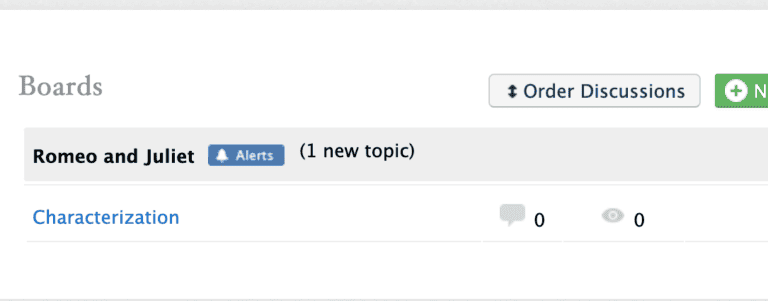Breaking It Down: The “E” in R.E.A.L.
R.E.A.L.® Discussion is a professional development program that equips faculty to teach, measure, and celebrate discussion skills – which students use in the classroom, in the cafeteria, on the court, and, even, at the grocery store (said one sixth grade girl) and on dates (shared a ninth grade boy)!
The whole system is based on the four R.E.A.L.® Skills, an acronym that breaks the art of discussion into teachable and transferable skills for a generation of students who would rather text than talk. The four skills are Relate, Excerpt, Ask and Listen – and the program teaches students to practice, master, and reflect on each.
In this series, we’re walking you through each R.E.A.L.® skill. Today, we’re analyzing E – the skill of Excerpting.
Excerpting: Skills and Habits
In theory, excerpting – that is, identifying relevant evidence from source material in support of a point the student plans to share in discussion – seems straightforward. In practice, though, any teacher who has led discussion will tell you: kids do not intuitively do it well.
In a sub-optimal discussion, students might do what we affectionately call “the quote drop”: i.e., read a quote from a text, with zero context or commentary, as a way to check the participation “box” without really adding much value to the conversation. Other excerpting hazards include students speed-reading their pre-selected quotes, so their classmates can’t keep up; selecting a quote that’s too long, so their classmates zone out; or everyone selecting the same quote (and saying a lot of: “to piggyback on what so-and-so said…”). The tell-tale sign of not-yet-excellent-excerpting? Comments that start with “my quote is on . . .” instead of leading with the idea the quote will support!
That’s not what excerpting looks like in classrooms that employ R.E.A.L. ® Discussion. In our program, we name the foundational discussion skill – in this case, EXCERPTING – then identify “habits” students can practice in order to master that skill.
For example: if one Excerpting habit is “Excerpt with Efficiency,” R.E.A.L. ® teachers focus on helping students distill quotes that are the most relevant and assisting their classmates as they bring them along on discussion. One skill associated with Excerpting with Efficiency includes taking intentional, initially awkward-feeling pauses before reading evidence to ensure classmates actually flip to the quoted passage in order to follow along. Once the class has all located the quote, the speaker knows to provide context – a critically important skill in today’s information-rich world – before reading the piece of evidence. Students then learn to respect the “rule of seven” – that is, avoiding reading aloud for more than seven seconds, and using several paraphrasing tools to do so. This rule helps students make the quotes serve their editorial purposes, so they can focus on the most salient parts more quickly. Not only does this help move discussion along – it’s also powerful practice for later writing.
R.E.A.L. ® doesn’t just help students learn the habits of efficient excerpting. The program also assists students as they learn to add their own perspective to the quotes they share, so discussion becomes a rich tapestry of opinions rather than a roll call of relevant quotes. Saying something “meaningful” can feel daunting for students, so R.E.A.L. ® breaks the process down into doable skills.
For example, if a student has difficulty coming up with meaningful analysis for a given quote, the R.E.A.L.® program reminds them that every word in the text has been deliberately chosen by the author. R.E.A.L.® Discussion portfolios offer prompts that facilitate analysis. For example, in an English class, a student who initially thinks they have nothing to say about a quote is prompted to consider questions like: why do you think the writer chose the words they did? Does a title seem surprising? A grammatical construction seem off? A depiction of character seem harsh? How do you hear the passage as a reader? What might that say about the author?
By providing these specific skills, habits, and examples – along with routines for practice and reflection – R.E.A.L.® helps teachers demystify discussion for students, opening the door to rigorous, equitable classroom conversations.
Excerpting is a skill that students appreciate honing, because it makes the discussion itself more engaging – and the writing afterwards much, much easier. When students learn to excerpt they feel powerful – and the associated analysis that comes with the skill becomes accessible, interesting, and maybe even fun.
Want to learn more about Relating and R.E.A.L.®’s other three foundational skills? Reach out to our team for a conversation today.






